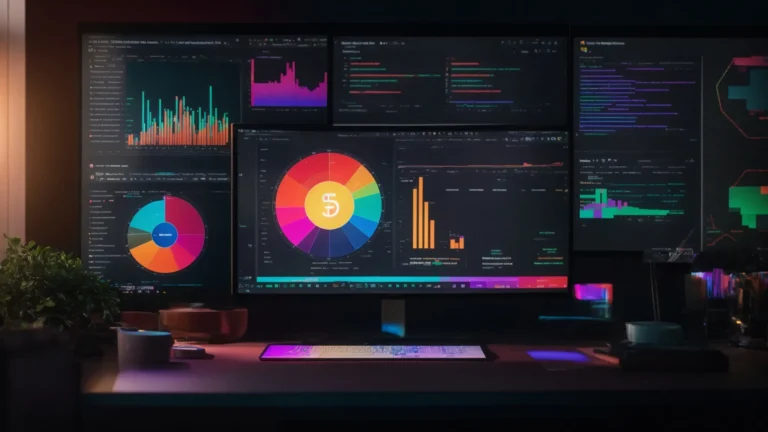Heads Up: When you purchase through links on our site, we may earn an affiliate commission at no cost to you.
Are you struggling to enhance your brand‘s visibility on search engine results pages? Many real estate investors overlook the impact of social signals on SEO rankings. In this article, you will learn how social engagement influences your website’s performance, the metrics that matter, and best practices for integrating social media into your SEO strategy. By understanding these elements, you can better connect with your target audience, optimize your backlink profile, and utilize tools like Google Analytics to evaluate your success. Let’s explore how you can leverage social signals to strengthen your SEO efforts.
Key Takeaways
- Social signals indicate content relevance and can enhance your SEO rankings.
- Engaging with your audience boosts traffic and drives backlinks to your site.
- High user interaction on social media reflects content value to search engines.
- Fostering community engagement increases brand loyalty and aids in SEO success.
- Use insights from social interactions to refine your content strategy effectively.
Understanding the Connection Between Social Signals and SEO Rankings

Social signals significantly affect how search engines evaluate your website’s authority and relevance. When users engage with your content on social media, it often leads to increased visibility, which can drive traffic back to your site. This interaction sends positive signals to search engines, improving your chances of higher rankings in search results.
Brand awareness is key in digital marketing. When your content is shared widely on social platforms, it expands your reach and showcases your brand to a broader audience. Higher brand awareness can lead to more visitors and potential backlinks, enhancing your link-building efforts and benefiting your SEO strategy.
Analytics reveal that social media activity correlates with site traffic and user engagement metrics. These metrics can provide insight into what content resonates with your audience, helping you refine your digital marketing efforts. Analyzing these patterns allows you to create more targeted content that attracts social sharing and organic search traffic.
Moreover, a strong social presence can support your overall link-building strategy. Influencers or users sharing your content may garner more backlinks from high-quality sites. Those backlinks further enhance your search engine rankings, creating a positive feedback loop that boosts your visibility and authority in the digital space.
- Instant feedback
- Valuable insights
- Actionable tips
The Role of Social Signals in Search Engine Algorithms

Social signals significantly influence search engine algorithms. When users engage with your content on platforms like Facebook and Twitter, it indicates relevance and authority to search engines. This interaction can enhance your overall reputation in the digital landscape.
As you implement effective content marketing strategies, consider how social activities contribute to your search engine optimization efforts. Engaging content that resonates with your audience encourages shares and increases visibility in search engine results. This synergy is essential for boosting your site’s traffic and visibility.
Customer engagement on social media platforms is vital in determining your content’s performance. High levels of interaction—likes, shares, and comments—signal to search engines that your content is valuable. This can lead to improved rankings and greater organic reach.
Analytics help you understand the impact of social signals on your SEO rankings. You can adapt your strategies to improve your content’s effectiveness by tracking user engagement metrics. For this reason, maintaining an active social presence is crucial for achieving success in the Internet marketing landscape:
| Aspect | Impact on SEO |
|---|---|
| Social Signals | Indicate content relevance and authority |
| Customer Engagement | Increases visibility and site traffic |
| Content Marketing | Enhances shareability and reach |
| Reputation | Affects search engine credibility |
| Search Engine Optimization | Improved rankings support |
Social Engagement Metrics That Influence SEO Performance

Social Engagement Metrics That Influence SEO Performance
User interaction plays a crucial role in your site’s rankings, as search engine algorithms prioritize content that fosters engagement. The number of likes and shares your content receives directly affects its visibility, making it essential to encourage these actions. Additionally, comment activity not only signals audience interest but also provides valuable information that can improve user experience and enhance your PageRank.
User Interaction and Its Effect on Rankings
Higher user interaction on social media platforms can significantly improve your content’s rankings. Using sentiment analysis, you can gauge how your audience feels about your posts, as positive feedback encourages more engagement. This data-driven approach helps you tailor your content to meet your audience’s preferences better, enhancing your advertising efforts and driving growth.
Social media analytics are vital in understanding which types of content yield the best results for your SEO strategy. By focusing on keyword research and the content that generates the most likes, shares, and comments, you can create a more engaging experience for your audience. Increased interaction not only signals to search engines the value of your content but also helps build a loyal community around your brand.
Impact of Shares and Likes on Content Visibility
The impact of shares and likes on content visibility cannot be overstated. Research indicates a strong correlation between high engagement levels, such as likes and shares on social media, and improved visibility in search engine results. When your content garners attention through social interactions, it signals to search engines that your material is relevant and worth promoting, thus enhancing your overall SEO rankings.
Moreover, as you actively foster engagement on your social media platforms, you’re likely to see a boost in organic traffic. Each share acts as a vote of confidence, expanding your reach to new audiences and creating more opportunities for backlinks. By prioritizing these engagement metrics, you can better align your content strategy with your audience’s preferences and needs, further driving attention and relevance in search engine algorithms.
The Significance of Comment Activity in SEO
Comment activity on your content is a crucial factor that boosts your SEO efforts. When users engage in discussions, it not only demonstrates credibility but also indicates to search engines that your content is valuable and relevant. By fostering a vibrant community around your posts, you can enhance your marketing strategy, leading to higher visibility and improved rankings in search results.
Encouraging comments allows you to gain insights into your audience’s preferences and challenges, making it easier to refine your web design and overall marketing approach. This interaction creates opportunities for deeper connections, as users feel heard and valued within your social network. Ultimately, prioritizing comment activity can significantly amplify your SEO impact while building a loyal following around your brand.
How Social Media Platforms Can Affect Your SEO Strategy

Using social platforms for content promotion is essential in modern SEO strategies. Engaging with your audience can lead to higher domain authority through social links, which enhances your visibility in Google Search and Microsoft Bing results. In the following sections, you’ll learn how to create effective calls to action and leverage social media marketing to improve your overall SEO experience.
Using Social Platforms for Content Promotion
Using social platforms for content promotion is a powerful strategy that can elevate your brand‘s visibility and authority. By sharing impactful social posts across various channels, you engage your audience directly, encouraging interaction and shares. High-profile figures in the SEO field, such as Matt Cutts, have long emphasized the importance of integrating social media SEO into your overall strategy, suggesting that these interactions play a role in how search engines perceive your content.
To leverage social media for SEO effectively, consider tailoring your posts to resonate with your target audience. Utilize a combination of compelling visuals and engaging copy to prompt user interaction. When your content garners attention on platforms like Facebook or Twitter, it enhances your social SEO efforts, which can lead to increased organic traffic and ultimately benefit your SaaS SEO initiatives. Focus on building relationships through your social engagement to strengthen your online presence and drive relevant traffic to your site.
The Influence of Social Links on Domain Authority
Social links are crucial for enhancing your domain authority in today’s digital landscape. When your content is shared on various media platforms, especially by users with established credibility, it can create meaningful connections and boost your overall authority. Although some links are labeled as “nofollow,” they still provide visibility and can drive traffic, thereby contributing to your broader SEO objectives.
Content creation that encourages sharing on social media can significantly impact your SEO strategy. Each time someone shares or links to your content, it leads to increased exposure and the potential for more backlinks from other sites. By cultivating an engaging social media presence, you enhance your chances of securing valuable links that can further improve your rankings in search engine results.
Best Practices for Leveraging Social Signals to Boost SEO

To effectively leverage social signals for improved SEO rankings, you should focus on several key strategies. First, explore effective techniques for increasing social engagement and fostering a two-way conversation that resonates with your audience. Next, you’ll learn how to optimize content for social sharing, enhancing its appeal and accessibility. Finally, analyzing social signal performance will provide insights into user behavior and its causality with your SEO gains, enabling you to refine future strategies.
Strategies for Increasing Social Engagement
To increase social engagement, consider your audience and develop a strategy that encourages interaction. Utilize tools like Hootsuite to schedule posts at optimal times to maximize visibility and engagement. Furthermore, incorporating captivating images with your content can significantly draw attention and prompt users to share, thus enhancing your overall reach and impact.
Creating dynamic content that resonates with your audience establishes a flywheel effect, where increased engagement fuels further interactions and shares. Consider hosting polls or asking questions that invite commentary and participation, making your followers feel valued. This two-way communication nurtures relationships and reinforces your brand’s presence, driving more traffic to your site and positively influencing your SEO rankings.
Optimizing Content for Social Sharing
To optimize content for social sharing, you should create engaging, high-quality posts that resonate with your target audience. Incorporating visuals like infographics or videos can significantly boost your chances of sharing, as these elements often draw more attention when shared on social media platforms. Using artificial intelligence tools can help analyze which content types perform better, allowing you to tailor your posts to specific demographics and enhance user engagement, effectively harnessing social proof.
Furthermore, make sure your content is easily shareable across various platforms, including mobile apps. Incorporating social sharing buttons is essential, as they encourage users to share directly from your site. This approach supports your overall SEO strategy by aligning with search algorithms that favor widely shared and engaged content. By understanding these dynamics, you can build a robust online presence that drives organic traffic and enhances your marketing efforts, such as Google Ads campaigns.
- Create engaging, visually appealing content.
- Utilize AI tools for audience analysis and content optimization.
- Ensure easy sharing with social buttons on your site.
- Align content strategies with social proof and search algorithms.
Analyzing Social Signal Performance for SEO Gains
To effectively analyze social signal performance for SEO gains, you should regularly monitor metrics using tools like Google Search Console. This allows your company to track the correlation between social media engagement and your website‘s performance, including bounce rate and user interaction. By understanding these patterns, you can identify what content generates the most engagement, helping you create focused strategies that drive better results.
Incorporating tags in your content is another vital aspect of this analysis. Tags not only help categorize your posts but also make it easier to assess which topics resonate most with your audience. By examining which tags correlate with higher social shares and lower bounce rates, you can refine your content to enhance engagement and improve your overall SEO performance.
Evaluating the Impact of Social Signals on Your SEO Efforts

To evaluate how social signals impact your SEO efforts, focus on key metrics that reflect the effectiveness of your community engagement. Monitoring signals such as shares and likes can reveal customer interaction trends. Utilize tools designed to measure SEO improvements stemming from these social signals, ensuring you capture valuable data to refine your strategies and enhance your online presence.
Metrics to Monitor for Social Signal Effectiveness
Monitoring key metrics is essential to effectively gauge the impact of social signals on your SEO rankings. Focus on engagement statistics such as likes, shares, and comments on your posts, as these indicators reflect how well your audience perceives your content. Tools such as Google Analytics can help you track these interactions, providing insights into how social search influences your site’s visibility and authority.
Another important aspect to consider is the referral traffic generated from social media platforms. Observe how much traffic comes from specific social channels to understand which platforms resonate most with your audience. Assessing these patterns can guide your content strategy, allowing you to tailor your posts to boost engagement while enhancing the overall perception of your brand in the digital landscape.
Tools to Measure SEO Improvements From Social Signals
To effectively measure SEO improvements stemming from social signals, utilize tools such as Google Analytics and social media management platforms. These tools can help you track user engagement metrics, allowing you to see how interactions on social media correlate with your site traffic and search performance. By analyzing referral traffic, you can pinpoint which social platforms yield the highest engagement, guiding your content strategy to focus on the most beneficial channels.
In addition to Google Analytics, consider using tools like SEMrush or Moz to monitor keyword rankings and site authority over time. These platforms provide insights into how social signals influence your search engine visibility, helping you refine your approach. You can establish a connection between social media efforts and your overall SEO success, ensuring you make data-driven decisions that enhance your digital marketing strategy.
Frequently Asked Questions About Social Signals and SEO Rankings

Frequently Asked Questions About Social Signals and SEO Rankings
Understanding social signals is essential for enhancing your SEO strategies. You’ll learn what social signals are and why they matter for your SEO efforts. Can you replace traditional SEO tactics with social signals? Discover how social signals influence organic search visibility and the long-term effects they have on your rankings.
What Are Social Signals and Why Do They Matter for SEO?
Social signals refer to user interactions and engagements on social media platforms, such as likes, shares, and comments. These signals are important for SEO because they indicate the relevance and popularity of your content to both users and search engines. When your content garners attention and engagement, it creates an impression of credibility, which can positively influence your site’s search rankings.
Moreover, social signals can drive traffic to your website and help increase visibility across digital platforms. For instance, when users share your content on their social profiles, it can reach a wider audience and potentially generate backlinks, which are crucial for SEO. As you focus on creating shareable and engaging content, you’ll likely see improved organic search results and greater audience connection:
- Understanding the importance of social signals for SEO
- How user engagement impacts your search rankings
- The role of shares and likes in driving traffic
- Creating content that resonates with your audience
- Leveraging social media to enhance your online presence
Can Social Signals Replace Traditional SEO Tactics?
Social signals can enhance your SEO efforts, but they should not replace traditional SEO tactics. While social signals, such as shares and likes, indicate relevance and can drive traffic, foundational practices like keyword optimization, quality content creation, and link-building remain essential for a robust SEO strategy. Balancing both systems allows you to leverage the immediate benefits of social interactions and the long-term growth that comes from consistent SEO work.
Integrating social signals into your overall SEO approach can amplify your results. Engaging with your audience on social media may provide insights that inform your keyword choices or content strategies, ensuring you address user interests effectively. Remember, social signals serve as a complement to traditional tactics, driving organic traffic while also building your authority in a competitive market.
How Do Social Signals Affect Organic Search Visibility?
Social signals, such as likes, shares, and comments, directly affect your organic search visibility by indicating to search engines that your content is valuable and engaging. When your posts receive high levels of interaction on social media, they signal relevance to search engines, potentially leading to improved ranking positions in search results. The more your content is shared, the wider your reach becomes, ultimately driving more organic traffic to your website.
To leverage social signals effectively, focus on creating content that encourages engagement. By prompting discussions or asking questions, you can increase the likelihood of social interactions. As user engagement rises, search engines recognize this activity as a sign of authority, leading to greater visibility for your content and improve SEO outcomes for your website.
What Is the Long-Term Impact of Social Signals on Rankings?
The long-term impact of social signals on your SEO rankings can be substantial. As your content receives likes, shares, and comments, it signals to search engines that your material is engaging and valuable, which can lead to improved visibility over time. This consistent interaction can help establish a stronger online presence, reinforcing your authority in your niche and attracting more organic traffic.
Furthermore, regular engagement on social media fosters community and brand loyalty. When users actively participate with your content, it not only enhances your reputation but also increases the likelihood of referrals and backlinks from other websites. This synergy between social signals and SEO can create a sustained positive effect on your rankings, ultimately driving growth for your real estate investment initiatives:
| Aspect | Long-term Impact on SEO |
|---|---|
| Social Signals | Indicate ongoing content relevance and authority |
| User Engagement | Builds community and brand loyalty |
| Backlinks | Enhances site authority over time |
| Content Visibility | Increases organic traffic and leads |
Frequently Asked Questions
What are social signals, and how do they influence SEO rankings?
Social signals refer to the engagement metrics from social media platforms that can influence SEO rankings. Positive interactions, such as likes and shares, indicate content value, helping improve visibility and authority in search engine results.
Do social media shares affect search engine algorithms directly?
Social media shares do not directly impact search engine algorithms. Still, they can increase visibility and drive traffic, which may lead to higher rankings over time through organic links and growth in user engagement.
Which social engagement metrics are most important for SEO performance?
Key social engagement metrics that impact SEO performance include shares, comments, and likes. These interactions signal content relevance and popularity to search engines, influencing rankings and helping real estate investors enhance their online visibility.
How can I integrate social media platforms into my SEO strategy?
Integrating social media platforms into your SEO strategy can enhance visibility and drive traffic. Share quality content, engage with followers, and use relevant hashtags to improve search rankings and attract potential real estate investors.
What is the best way to measure the impact of social signals on SEO?
To measure the impact of social signals on SEO, track referral traffic, monitor social engagement metrics, and analyze keyword rankings. Tools like Google Analytics and social media insights can help you evaluate these relationships effectively.
Conclusion
Social signals play a vital role in enhancing your SEO rankings by demonstrating content relevance and authority. Engaging users through likes, shares, and comments leads to increased visibility and organic traffic, which search engines recognize and reward. By fostering a strong social presence and creating shareable content, you not only drive user engagement but also improve your website‘s search performance. Prioritizing social signals in your SEO strategy offers a powerful opportunity to elevate your online presence and attract more potential customers.














